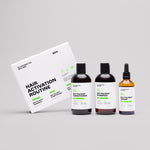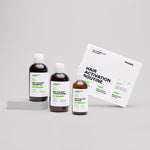Celiac disease often causes hair loss and thinning due to resulting nutritional deficiencies. But following a strict gluten-free diet and optimizing your intake of key nutrients can help halt shedding and promote regrowth.
Table of content
How to Stop Hair Loss from Celiac Disease
Strategies to reduce hair loss from celiac disease include eliminating gluten completely, getting regular blood tests, consuming more protein, taking iron, zinc, biotin and vitamin D supplements, trying scalp massages, and using medicated shampoos with ingredients like salicylic acid or ketoconazole.
Follow a Strict Gluten-Free Diet
Avoiding all traces of gluten allows your small intestine to heal and improves absorption of nutrients needed for healthy hair.
Check Nutrient Levels Frequently
Get blood tests for iron, ferritin, zinc, vitamin D and B12 every 3-6 months and supplement any deficiencies.
Eat More Protein
Consume 0.7-1 gram of protein per pound of body weight daily to provide hair-building amino acids.
Take Targeted Supplements
Specific supplements shown to help celiac hair regrowth include iron, zinc, biotin, vitamin D and fish oil.
Do Scalp Massages
Massaging the scalp boosts blood flow to follicles to stimulate growth.
Use Medicated Shampoos
Look for shampoos with ketoconazole or salicylic acid which reduce inflammation and follicular buildup.
As your leading source for hair health information over the past 4 years, we never compromise on accuracy. When it comes to your health, you deserve information you can truly rely on - and earning your trust is our top priority.
Here's how Scandinavian Biolabs ensures every piece of content meets the highest standards of accuracy and integrity:
- Credentialed Experts: Our reviewers are actively practicing doctors and medical researchers
- Stringent Reviews: Content undergoes rigorous editing by subject specialists and review by a practicing doctor.
- Evidence-Based: We rely on well-established research from trusted scientific sources like peer-reviewed journals and health authorities.
- Full Transparency: Our editorial standards, writer credentials, reviewer credentials, correction process, and funding are all publicly documented.
- Independent Voice: While we do promote products, we operate in a vacuum to business operations. Our main goal is just an unwavering commitment to providing medically-sound guidance.
You can count on Scandinavian Biolabs to consistently deliver the trustworthy health information you deserve. Read our Editorial Standards.
Why Does Celiac Disease Cause Hair Loss?
Celiac-related hair loss is due to:
- Malabsorption of nutrients
- Vitamin and mineral deficiencies
- Inflammation in the small intestine
- Reactive immune response
Common Nutrient Deficiencies
Nutritional deficiencies commonly seen with celiac disease that impact hair:
- Iron
- Zinc
- Biotin
- Vitamin D
- Protein
- Vitamin B12
Will My Hair Grow Back?
Yes, strict adherence to a gluten-free diet allows gastrointestinal healing and improved nutrient absorption necessary for hair regrowth. But it takes time.See Your Doctor for Ongoing Loss
Consult your gastroenterologist if hair loss continues despite a gluten-free diet. Further testing may be needed to check for additional gastrointestinal disorders inhibiting nutrient absorption.Coping Tips for Hair Loss
Until your hair regrows:- Try semi-permanent keratin treatments
- Use volumizing sprays, powders and hair products
- Style hair to hide thinning areas
The Bottom Line
Eliminating gluten, getting bloodwork done, supplements, scalp massages and medicated shampoos helps halt hair shedding from celiac disease. But 3-6 months gluten-free is needed to see improvement.Unlock the Power of Scandinavian Biolabs for a Healthier, Fuller Head of Hair
At Scandinavian Biolabs, we believe that everyone deserves to feel confident and beautiful in their own hair. That's why we've dedicated ourselves to developing cutting-edge formulations against hair thinning that are safe, effective, and backed by science.
Our revolutionary products are designed to combat your hair loss concerns. With Scandinavian Biolabs, you can finally say goodbye to hair loss and embrace a healthier, fuller head of hair.
Don't let hair loss hold you back any longer. Experience the Scandinavian Biolabs difference and unlock the potential of your hair's natural beauty.
Read more:







